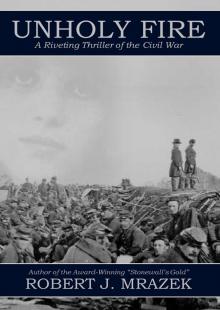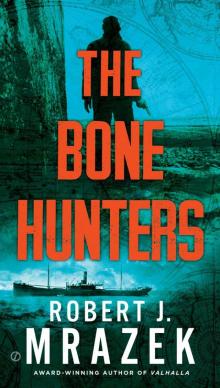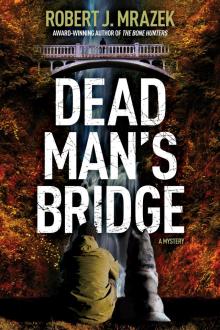- Home
- Robert J. Mrazek
Dead Man's Bridge Page 3
Dead Man's Bridge Read online
Page 3
“Damn it, you eat better than I do,” I said.
She looked up at me balefully with those big chocolate eyes, as if she was missing her home in the Khyber Pass and wondering why I had brought her halfway around the world to this godforsaken place.
“Julia Child slaved over this for you,” I said.
After using the line so many times over the years, I didn’t have the heart to tell Bug that she was dead. It rarely worked anyway.
“Cut the bullshit and eat it,” I demanded.
As if granting me a royal dispensation, she slowly lowered her nose to the edge of the bowl and took an exploratory nibble.
“That’s it. That’s it,” I encouraged as she chewed the first bite without enthusiasm.
She paused again as if waiting to be congratulated.
“Congratulations,” I said.
She ate two more mouthfuls of chicken before pausing to lap up a few swallows of water. The bones of her lower rib cage were now protruding through the skin above her stomach. If things continued this way, the only solution would be to force-feed her, which I hated to contemplate any more than the idea of someone force-feeding me. Stepping away from the bowl, she trudged over to the daybed in the far corner of the porch and dropped onto her favorite quilt.
I had slept maybe three hours the previous night. In two hours, I was facing an idiotic inspection. Going back into the kitchen, I began brewing strong coffee in my blue enamel pot.
While it was heating, I walked down to the boathouse at the edge of the lake. I picked up the cracked leather gloves on the workbench and went over to the sand-filled canvas heavy bag that hung over the finger dock.
I began delivering shots to it, slowly at first, measuring the range.
Why had I come back here? I asked myself for the thousandth time. I knew it wasn’t to endure the taunts of people like Jim Dickey, although I had heard plenty of worse things said about me during my court-martial trial. After I let the army finish me off, I didn’t really care what happened anymore.
The heavy bag began to swing back and forth in an easy rhythm.
Part of the reason for coming back was that this place had been as close to a home as I ever had. I was twelve when my parents died together in a plane crash. My aunt and uncle sent me off to boarding school. I was pretty much on my own after that. At St. Andrews, everything had come together for me. Life seemed filled with golden promise.
And then I met Blair.
In truth, I had come back here because of her.
I met her during the fall semester of my sophomore year. She had come up from Wellesley for a football weekend, and she was at a party at our fraternity house the Saturday night after the homecoming game. From the first moment, I thought she was the most fabulous girl I had ever seen.
It wasn’t just her violet eyes and wholesome beauty. She was animated and funny and projected an amazing blend of innocence and sensuality. We spent the rest of that night talking together in my room. I never touched her. Mostly we talked about literature, music, politics, and her dreams of helping change the world—“a world where children didn’t have to grow up in fear of violence or hunger.” She actually used to talk like that. I was convinced that if we had a lifetime together, we would never be talked out.
We spent spring break together camping in the Adirondacks. During the course of those few days, she awakened emotions in me I never knew I had. She made love with an almost savage passion. I felt such pride knowing she had become mine.
The next semester she transferred to St. Andrews, and we lived together our last two years in college. After graduation, we spent two months in Europe on a used BMW police motorcycle I bought in Amsterdam. On many of those nights, we would just pull off the road into a wood stand, wolf down the food we had bought at a charcuterie, and curl up together in our double sleeping bag.
I was inducted into the army when we got back, and she took an advertising job in New York. We spent my first leaves together. When I was deployed to Afghanistan, her gift to me was a silver dog tag. Engraved on it were the words, “To Jake . . . From Your Constant Heart.”
Nine months into my tour, the letter came. She had fallen in love with another man, she wrote. She never meant to hurt me, it went on. It just happened. After that, the natural order of my life was gone.
Get over it, I had said to myself. Grieving over a lost love in this demented world was ridiculous. You’ve just managed to survive the mother of all battles. Move on. But I still loved her. I felt as if I had been cheated out of all the things that lay ahead of us.
I began whaling harder on the heavy bag, delivering pounding blows that I felt straight up my shoulder. At the end of another five minutes, the sweat was pouring off me, my knuckles were sore, and my arms were spent.
Stripping off my sweaty clothes, I went off the dock in a flat dive. I swam out into deep water, rolled over on my back, and floated for several minutes, looking up at the cobalt-blue sky.
I still carried the torch.
Swimming slowly back to shore, I picked up my clothes and walked naked up to the cabin. After checking to see that Bug was still asleep, I poured my first cup of coffee and shaved at the kitchen sink. I no longer used a mirror.
Whenever I looked in one, it wasn’t with cool appraisal. It was an angry confrontation. “You stupid asshole” was my favorite personal greeting to myself. In the reflection of the windowpane, I saw the hazy image of uncombed hair and a blunt, wind-burned face.
The summer cottages on both sides of my cabin had been locked and shuttered for the winter. The woods were silent. From somewhere down the lake, I could smell burning leaves in the cool fall air.
When I turned on the radio, I was expecting to hear a news bulletin about the death of the man in the gorge. Instead, the news announcer reported that Hurricane Ilse had finished pounding South Carolina with 120-mile-an-hour winds. It was on its way north on a route that would take it up along the Alleghenies and possibly hit upstate New York early Sunday morning.
I found myself excited at the prospect. Storms have always wound me up. Mostly, it was the pure clean force of them—the blizzards, gales, hurricanes, even the one monsoon I had lived through.
After a shower, I found my least-wrinkled uniform in the closet and brushed the grayish-white dog hair off the burgundy blouse and pants. After a quick spit-polish of the dress shoes, it took me less than five minutes to press the uniform. That was another talent I had gotten very good at in the army. That and killing people.
Before leaving the cabin, I refilled Bug’s water bowl and propped open the porch screen door with a paving brick so she would have access to the small stretch of grass that led down to the lake. She loved the freedom of roaming her tiny domain. There was no chance of her taking off. Unlike Blair, she would wait for me forever.
By the time I got back to campus, it was about eight thirty, and the roads into the college were swollen with newly arriving alumni. Traffic slowed to a standstill as they stopped in the middle of the streets to read the plastic signs erected to help them find their reunion classes.
They were of every age and hue, the older ones wearing straw hats and blazers. Most had name tags around their necks as they revisited the places where they had spent four years of their lives so long ago.
Some of the older alumni were already wilting and had stopped under the branches of the big oak trees that rimmed the quad. The current students surged around them, heading to the new campus learning centers.
Back when I had gone to St. Andrews, the quad had served as home to the arts and sciences. That’s where we took all our courses. The buildings were the ivy-covered stone edifices with medieval arches that you still see in the recruiting guide.
Now those buildings housed professor’s offices and support staff. All the classes were taught in the new campus learning centers. There was a Latino learning center, an Africana learning center, a nanoscience learning center, a computer science learning center, and an Asian learning
center. A gay, lesbian, bisexual, and transgender learning center was under construction next to the campus store.
The college had undergone many changes in the century and a half since its founding. It was named by an early Scottish benefactor to the school after the original St. Andrews in Scotland, which is the third-oldest college in the English-speaking world.
With all the car traffic clogging the campus, I couldn’t find a parking place and finally pulled into the lot behind the administration building, slipping into the last open space.
A painted sign on the curb read, “Reserved for Provost.” Getting out of the truck, I placed my own cardboard sign behind the windshield wiper. It read, “Official Police Business.” Putting on my uniform hat, I headed toward the campus security building.
A massive banner was stretched across the stone portals leading to the arts quadrangle. It read, “The Age of the Mastodon.” There was a realistic rendering of a great woolly mammoth below it. He gazed down at me with a look of sad detachment, as if all he wanted to do was disappear back into his glacier. I knew exactly how he felt.
The campus police department was housed in a two-story brick building next to the student athletic facility. A few years earlier, contractors had ripped out the old plaster walls along with the crown moldings, wainscoting, and polished walnut doors. The new walls were about as thick as cardboard and the doors made of laminated plastic.
When I came in through the rear entrance, two kids were sitting on the oak bench inside the wire mesh holding pen at the back of the squad room. The first one looked like the Pillsbury Doughboy with curly red hair and pasty-white skin. He was crying. The other kid looked Spanish or Italian, with shoulder-length black hair and small, close-set eyes.
They were maybe eleven years old, both wearing baggy jeans shoved down below their hips, new basketball sneakers, NBA jerseys, and baseball caps cocked to the right side.
“You dog these hoes, man,” said the black-haired boy. “It’s you yo’self.”
I figured them to be sons of St. Andrews professors in full rebellion.
“So what did you nefarious characters do?” I asked the red-haired one.
“We . . . uh,” he began, wiping away tears. “We . . . uh . . .”
“Shut the fuck up, Cody,” said the black-haired one.
“Mi casa es su casa,” I said.
“You tryin’ ta do me, asshole?” he demanded.
I headed across the squad room to my plastic-walled cubicle in the corner. I had just sat down at my desk when Carlene came in and headed straight for the coffee server against the far wall. She kept glancing at me out of the corner of her eye.
“Working overtime?” I asked, trying to make peace after our earlier conversation.
Ignoring me, she poured herself a cup of decaf, added three spoons of sugar, and left the same way she had come.
The rear entrance door swung open, and a stout man wearing an orange polo shirt and orange golf pants came into the squad room. After giving a fleeting glance to the boys in the holding pen, he walked over to me.
“Officer Cantrell,” he said, looking down at my nameplate. “I don’t believe I know you.”
He was in his sixties with bloodshot eyes and a puffy nose. Red liver spots covered his bare arms.
“I’m sorry, but this area is off-limits to the public,” I said. “The public entrance is at the front of the building.”
“I’m not the public,” he said. “I’m Roger Marcham. Why don’t you just trot up to Janet Morgo’s office and tell her that I’m here to see my clients.”
He obviously thought the name would mean something to me.
“Why not just call Federal Express?” I asked. “They’ll overnight you up there.”
The black-haired kid in the holding pen snickered loudly.
“I will make sure your obnoxious behavior is conveyed to Captain Morgo,” said Roger Marcham before he headed down the corridor.
The squad room phone began to ring.
“Cantrell,” I answered.
“This is Jim Dill down at Groton Fire and Rescue,” said the voice. “On that five-niner . . . we’ve had a team down in the lower falls for the last two hours.”
“Did you find his head?” I asked.
“Negative . . . but we did find his hat.”
“That’s a start.”
“We’ve got a diver in position at the entrance to the lake,” he added. “A team of volunteers is going to make a search of the shallows at the base of the falls in about an hour.”
“What’s the prize for the lucky searcher?”
“Losing his breakfast,” he replied.
“Thanks for the update.”
My head was throbbing, and I went over to the small refreshment bar. I filled my mug from the coffeepot on the Formica table and went back to my cubicle to read the morning newspaper.
The lead story was about the Tenth Mountain Division being deployed overseas again out of Fort Drum. Remembering how well they had done in Afghanistan brought back a flood of memories. I turned to the sports section.
The cover page was devoted to the homecoming football game. Kickoff was at two o’clock. Coach York was expecting great things from his sophomore tailback. I put down the paper and yawned.
In the army, I had learned how to sleep just about anywhere and perfected a technique that allowed me to pretend I was listening to a bullshit briefing while keeping my head down, seemingly focused on the folder in my lap. The hardest thing to do was keep my head from nodding. I could go five or ten minutes in the same position and awake refreshed.
Pulling out a security office training manual from the shelf against the wall, I spread it open on my desk. Positioning one hand next to the page, I dropped my head over it. A few moments later, I was asleep.
“Officer Cantrell?”
I opened my eyes and looked up to see Lieutenant Ritterspaugh standing at the side of my desk and staring down at the training manual. She was at least eight months pregnant. Her maternity dress had red lambs knitted onto the white cotton background.
“Good morning,” I said. “I was just brushing up on this manual about positive alternatives to incarceration.”
“Yes, I can see that,” she replied with a quizzical smile. “But I’ve been standing here for a full minute, and you never moved a muscle.”
“The material is quite compelling,” I said.
“May I see you in my office, please?” she asked.
“Of course.”
I followed her down the hall and up the stairs to her office. As we walked along, I remembered a moment when I was marched to the principal’s office after committing some infraction in the seventh grade.
Her office was at the end of the second-floor corridor. Its walls were painted a bright tangerine. A set of plastic shelves held houseplants in terra-cotta bowls. A stick of aromatic incense was burning in a miniature Buddhist shrine on her desk.
The digital clock on the wall clicked over to 8:59.
“Before we get started, I want you to know that I’m scheduled for a full inspection with Captain Morgo at nine o’clock,” I said.
“That has been postponed,” she said.
Lieutenant Ritterspaugh was blonde, pretty, and soft spoken. I remembered that prior to joining the department, she had been a psychiatric social worker at the Groton Medical Center.
“May I call you Jake?” she asked.
I knew I was in trouble. One of the things we were taught in Ranger training was the interrogation technique that involved building intimacy with your captured prisoner before dropping the hammer on him. It was probably the same thing with former social workers.
“Sure,” I said.
“Feel free to call me Emily.”
“Thank you.”
“I think you have the makings of a good officer, Jake,” she began.
I remembered a light colonel in Afghanistan saying precisely the same words to me a million years ago. He was killed in the moun
tain caves at Tora Bora.
“I also believe we should go through life with openness to internal growth.”
She paused as if waiting for me to say something. I didn’t.
“You should know that Carlene was in tears when I arrived here this morning,” she said next. “She is very intimidated by you.”
“I have never tried to intimidate her,” I said.
“Perhaps it’s your aura,” said Lieutenant Ritterspaugh.
“My aura?”
“We all have an aura, Jake. You happen to project a very strong one. Sometimes one’s aura can cause unintended consequences.”
“I would be happy to apologize to her if you think it would help,” I said.
“I’m afraid it goes deeper than that. Carlene told me that when she called to ask for your help, you were flippant and dismissive and initially refused to respond to her request to come to the scene of the suicide.”
So they had already concluded that it was suicide. I thought about confiding to her the reasons it was important to reopen the investigation. She didn’t give me a chance.
“Carlene found your words personally insulting and deeply misogynistic,” she added. “And if what she said is true, I have to agree with her.”
“I never said anything misogynistic,” I replied, trying to remember what I said.
“Do you remember making fun of the poor sorority girl who overdosed on drugs last month? Do you remember calling Carlene sweetheart?” she asked.
“Carlene was upset about being left alone. If I did call her sweetheart, it was just to calm her down.”
“The call was recorded, Jake. The facts will speak for themselves when I review the recording. Have you ever considered awareness therapy?”
“What kind of therapy?” I said, keeping my voice calm.
“Therapy that could bring you into contact with your inner self,” she said.
I was about to tell her that I would rather have a colonoscopy from Roto-Rooter when there was a knock on the door, and one of the secretaries poked her head in.
“I’m sorry to disturb you, Lieutenant, but Mrs. Wheatley is here, and Captain Morgo would like you to join them in her office.”

 Valhalla
Valhalla A Dawn Like Thunder
A Dawn Like Thunder Unholy Fire
Unholy Fire To Kingdom Come
To Kingdom Come The Bone Hunters
The Bone Hunters Dead Man's Bridge
Dead Man's Bridge